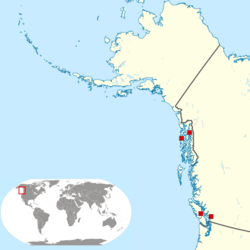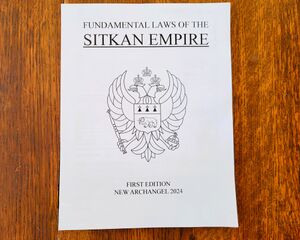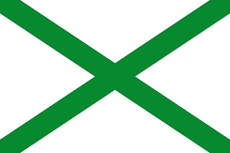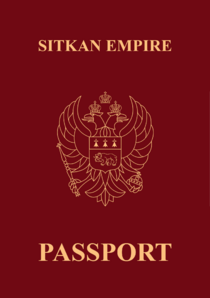Sitkan Empire
Sitkan Empire | |
|---|---|
| Motto: Ad multos annos (Latin) "For many more Years" | |
| Anthem: "God Save the Tsar!" | |
 Locations of territories under Sitkan administration. | |
| Status | Active |
| Capital |
|
| Official languages | English |
| Recognised regional languages | |
| Ethnic groups (2024) |
|
| Religion (2024) |
|
| Demonym(s) | Sitkan |
| Government | Unitary thalassocracy under an absolute monarchy |
• Monarch | Dustinian I |
• Grand Chancellor | Lucas Gonyer |
| Legislature | State Council |
| Independence from the United States | |
• Declaration | 12 March 2024 |
• Current constitution | 25 March 2024 |
| Population | |
• 2024 census | 18 |
| HDI | 0.936 very high |
| Currency | Canadian dollar ($) United States dollar ($) |
| Time zone | UTC-9 (Alaska (AKST)) |
• Summer (DST) | UTC-8 (AKDT) |
| Date format | mm/dd/yyyy |
| Driving side | right |
| Calling code | +1 |
| Internet TLD | .ex |
The Sitkan Empire, also known as Imperial Sitka or simply Sitka, is a North American micronation with territorial claims in Alaska and British Columbia. Its government declared its independence in 2024 but its existence is not formally recognized by the United Nations or the government of any sovereign state.[1]
The Sitkan Empire is governed under an absolute monarchy headed by the Sitkan Emperor. The emperor is a hereditary sovereign who reigns as the nation's head of state, while an appointed chancellor serves as head of government. It was founded in Sitka, Alaska by Canadian micronationalist Dustin Salisbury, initially as a social and political experiment to see how absolute monarchy and tsarist autocracy could function in 21st century North America. While lighthearted in nature, the project has nevertheless grown into a functional nation-state with serious aspirations of achieving internationally recognized statehood. Sitka considers itself a successor state to the Eastern Roman Empire, and by extension, the Russian Empire, via its claims to former colonial possessions of Russian America.[2]
Its foreign policy prioritizes diplomacy with other micronations and independence movements, as well as pressing its rights to self-determination in the wider international community. The empire currently has a population of 18 permanent residents and claims both physical and symbolic territories in three distinct regions along the Alaskan and British Columbian coastlines.
Etymology
The name Sitka is derived from Sheetʼká, a contraction of the Tlingit word Shee Atʼiká meaning "people on the outside of Baranof Island." Upon the establishment of the modern-day micronation, the term Sitkan Empire was adopted as it began to expand beyond the boundaries of the Sitka city-borough.
History

The Sitkan Empire was founded on 12 March 2024 by Dustin Salisbury, a long-time micronationalist who had previously founded the Kingdom of Permaria. During a trip to the Alaskan panhandle, Salisbury set about creating an independent North American monarchy and continuation of the Roman Empire by declaring the foundation of a successor state to Imperial Russia.[a] Symbolic territorial claims were established in Sitka, the one-time capital of Russian America, as well as the Alaskan state capital of Juneau.
Salisbury incorporated his own physical property on Vancouver Island, Canada into the new nation, bringing his goal of statehood closer to reality. Soon afterwards, the House of Salisbury was created to rule over his personal dominions alongside his family. Believing that absolute monarchy was the best model of government for a country with a very small population, Salisbury adopted the imperial title of emperor. Inspired by Byzantine emperor Justinian I, Salisbury chose Dustinian as his regnal name, and the newly-crowned emperor began his reign over the fledgling Sitkan Empire.
As the growing state began to expand through primarily coastal territories, the organizational structure of a thalassocracy, or maritime empire, began to take shape. Dustinian has since established a new territory in West Vancouver, bringing the number of regions with imperial dominions to a total of three. The population of Sitka has grown from 3 initial citizens at the time of its foundation to a present total of 18.
Politics and government
The Sitkan political system is highly centralized. The state is governed by a unicameral legislature under the leadership of a autocratic emperor. Day-to-day administration is directed by a Grand Chancellor, appointed by the emperor, who acts as the nation's head of government.
Emperor
Dustinian I, the Emperor and Autocrat of all Sitka, is the empire's reigning monarch and head of state. The Fundamental Laws of the Sitkan Empire describes the emperor as the symbol of the Sitkan state and the physical embodiment of the unity of its subjects, with Chapter 1, Article 4 stating: "...the Emperor of All Sitka possesses Supreme Sovereign Power. Obedience to His authority, not only out of fear, but in good conscience, is ordained by God Himself."
The empire's absolute monarchy is loosely based on the Imperial Russian model, specifically that which existed prior to the Russian Constitution of 1906, in which the emperor is an autocratic ruler and wields near-absolute power over domestic and foreign policy. Under Sitkan law, the emperor rules by divine right and exercises executive power through the State Council on behalf of the state and his subjects. The emperor has veto power, the authority to appoint and dismiss government ministers and judges, as well as the ability to hold or cancel referendums. The emperor is immune from prosecution by the Supreme Court of the Sitkan Empire. Eligibility to inherit the Imperial Throne is hereditary and limited to members of the ruling Imperial House. The monarchy of Sitka practices absolute primogeniture, with the emperor's first born child becoming heir apparent regardless of sex.

Grand Chancellor
Officially, executive power rests with the State Council, headed by the emperor himself. However, the council is chaired by a Grand Chancellor who acts on the emperors behalf, as well as acting as a close personal advisor. It is an appointed position at His Majesty's pleasure with no formal term limits. The main duties of the chancellor is to schedule and organize meetings of the State Council, hold votes on state policy, and sign all proposed bills into law after they are granted Imperial assent.
State Council
Sitka's State Council functions as both a unicameral legislature and a privy council to advise the monarch. There are currently 7 seats on the council, with eligibility being open to both nobility and commoners across the empire, although those among the landed gentry have more votes in the council. Members are appointed by the emperor on the advice of the Grand Chancellor and typically serve a renewable 2-year term. Under current Sitkan legislation, the State Council must convene at least once every six months, although it can be convened more frequently at the request of the emperor.
Law and order

The empire's Fundamental Laws dictate the rights, responsibilities and privileges of all Sitkan citizens, which are granted a substantial level of freedom. All subjects of the Sitkan Empire are guaranteed fair and equitable treatment regardless of social class or personal characteristics. Citizens have the same protected legal rights that they enjoy in the respective Canadian provinces or U.S. states that their imperial territories are located in. Sitkans are required to obey all macronational federal, provincial/state and local laws at all times. The same rule applies to its citizens living abroad with regards to the laws of their home countries. The Sitkan Emperor reserves the right to deny or revoke citizenship of any subject convicted of a criminal offense.
Military
The Imperial Sitkan Army and Imperial Sitkan Navy are the empire's primary land and naval forces. Sitka does not currently possess an active air force. The emperor is commander-in-chief of the armed forces which are collectively financed by the Ministry of War. The main duties of both military branches are defending the frontiers of the Sitka's scattered coastal territories while maintaining effective lines of communication between them. Emergency response and natural disaster relief are also key priorities. The empire claims to be an aspiring maritime power on a micronational scale, with much of its resources dedicated to naval and amphibious warfare as well as sea exploration and scientific studies.

Ministries
There are nine active ministries within the Sitkan government, collectively headed by the Council of Ministers. This council acts as an advisory body on state affairs, with each minister being directly responsible to the emperor. The current ministries are comprised of:
- Ministry of State
- Ministry of Finance
- Ministry of Internal Affairs
- Ministry of Foreign Relations
- Ministry of Justice
- Ministry of War
- Ministry of Agriculture
- Ministry of the Imperial Court
- Ober-Procurator of the Most Holy Synod
Foreign relations
To date, the Sitkan Empire has not received diplomatic recognition from the government of any internationally recognized sovereign state, but it has established diplomatic relations with several other micronations and independence movements. The Sitkan government cites the declarative theory of statehood, famously expressed in the 1933 Montevideo Convention, as legal justification for its sovereignty since it meets the criteria to be considered a sovereign nation.[b]

Unilateral recognition
 All United Nations member states
All United Nations member states British West Florida
British West Florida Cook Islands
Cook Islands Haida Nation
Haida Nation Holy See
Holy See Manchukuo
Manchukuo Molossia
Molossia Niue
Niue Sealand
Sealand Sancratosia
Sancratosia Somaliland
Somaliland Taiwan
Taiwan Tibet
Tibet Westarctica
Westarctica
Mutual recognition
Administrative regions
Sitka is comprised of six land claims across three distinct themes in Southeast Alaska, the Lower Mainland, and on Vancouver Island, respectively. Four of these territorial claims are physically inhabited while the remaining two are merely symbolic in nature. The emperor is also the king of Hurford, the largest and most autonomous of the empire's dominions, as well as the grand duke of Platova, its most populous.
Geography and climate

The empire's geography and climate varies depending on location. The northern Alaskan territories have an oceanic climate with moderate, but typically cool, temperatures and abundant precipitation. The southern Canadian regions have a warmer Mediterranean climate defined by the Köppen classification as having temperate weather year-round. Summers are warm and dry, while winters are mild and wet with the temperatures rarely falling below freezing.
The inhabited territories of the Sitkan Empire are primarily rural and semi-forested. The Congress Kingdom of Hurford is the empire's largest land claim and is comprised of grassland with horseback riding trails, wetlands, and large forests of Sitka spruce. As a protected nature reserve, it has no permanent human residents but is home to several species of ducks and other wild birds.
Economy
A tiny market economy exists in Sitka, although it is almost entirely reliant on imports from its larger American and Canadian neighbors for its continued existence. The Sitkan-American Company, a state-sponsored chartered company, and the State Bank of the Sitkan Empire are the two largest companies founded and operated within the micronation. Agriculture is the largest industry, accounting for nearly 90% of the country's economic output.
The Canadian dollar and the U.S. dollar are the dual official currencies of the empire. The Canadian dollar is the standard currency used within its larger Canadian-based territories as well as for international transactions, while the U.S. dollar is primarily used by subjects residing within Sitka's U.S.-based territories.
Culture
The concept of Renovatio imperii Romanorum, or "renewal of the empire of the Romans" plays a key role in the cultural fabric of the Sitkan Empire. The empire was founded on the basis of the revival and continuation of Byzantine and Russian imperial traditions on the North American continent. Most Sitkan subjects see themselves as spiritual successors of the Romans and this inspiration can be seen in all aspects of Sitkan society. The local cultures of Alaska, British Columbia, and the Indigenous peoples who have inhabited these lands for thousands of years also contribute to the unique identity of the nation and its citizens. Eastern Orthodoxy is the official state religion although the Fundamental Laws of the empire guarantee religious freedom as a protected right.
As a monarchy, Sitka has created numerous noble titles. The ranks of prince, duke, marquess, count, and baron, along with their associated female equivalents, make up the nation's aristocracy although these titles are not recognized outside of the Sitkan Empire.
National symbols
-
Civil flag
-
State flag
-
Coat of arms
The flag of the Sitkan Empire is a horizontal bicolour of green and white. A variant of the flag with the Sitkan coat of arms displayed on a yellow field in the canton serves as the empire's state flag and is reserved for government use on land, sea, and abroad. The colours have both cultural and regional meaning. Green symbolizes the aurora borealis above the snowy winter landscape of Alaska (white). Green also represents abundance and fertility, while white represents peace and purity.
A double-headed bald eagle, officially referred to as the "Imperial Eagle", is used as the empire's coat of arms. The eagle holds a golden sceptre and blue globus cruciger. On its chest there is an escutcheon with the arms of the Imperial House of Salisbury, depicting ermine above an American black bear. There are multiple versions of the coat of arms, including a lesser, middle, and greater achievement.
Holidays
Several holidays, both secular and religious, are observed in the Sitkan Empire. All labor is banned on religious holidays, as well as Emperor's Day, by imperial decree.
| Date | Name | Type | Notes |
|---|---|---|---|
| 1 January | New Year's Day | Secular | Celebration of the start of the new year. |
| 6 January | Epiphany | Religious | Commemoration of the baptism of Jesus. |
| 12 March | Foundation Day | Secular | Commemoration of the establishment of the Sitkan Empire on this day in 2024. |
| 25 March | Feast of the Annunciation | Religious | Commemoration of the visit of the archangel Gabriel to the Virgin Mary, during which he informed her that she would be the mother of Jesus. |
| 31 March (2024 date) | Easter | Religious | Commemoration of the resurrection of Jesus from the dead. |
| 9 May (2024 date) | Feast of the Ascension | Religious | Commemoration of the Ascension of Jesus into heaven. |
| 28 May (2024 date) | Pentecost | Religious | Celebrates the descent of the Holy Spirit upon the Apostles and other followers of Jesus. |
| 29 June | Feast of Saints Peter and Paul | Religious | Commemoration of the martyrdom of the apostles Saint Peter and Saint Paul. |
| 22 October | Emperor's Day | Secular | Birthday of Emperor Dustinian I. |
| 25 December | Christmas Day | Religious | Commemoration of the birth of Jesus. |
See also
Notes
- ↑ The Sitkan Empire considers itself a successor state to the Russian Empire that existed from 1721–1917, separate from, and not affiliated with, the current Russian Federation.
- ↑ The Declarative Theory of Statehood defines a state as a person in international law if it meets the following criteria: 1) a defined territory; 2) a permanent population; 3) a government and 4) a capacity to enter into relations with other states.
References
- ↑ "Independent States of the World" nationsonline.org
- ↑ "Moscow is the Third Rome" globalsecurity.org












